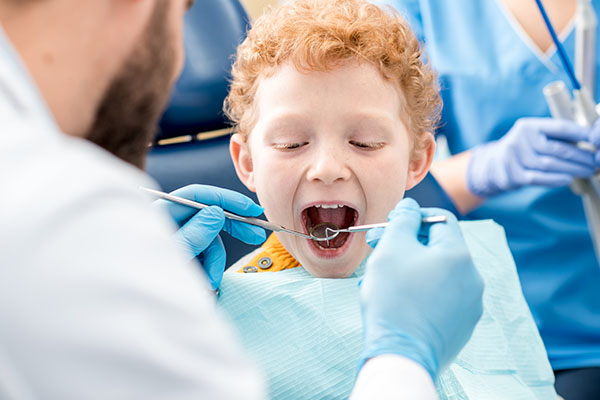Pediatric Dental Cavity Treatment Options for Infant Teeth

A child should have a pediatric dental examination around the same time that the first tooth erupts, which usually occurs at around six months old. In addition to checking for proper development and good oral health, dentists can look for signs of potential cavities. Erupted baby teeth are at risk for decay for a number of reasons. Milk, which is high in sugar, is the main source of nutrition for infants. When it is not properly cleaned away from the surfaces of the teeth, cavities can develop. This is especially true for young children who drink from a bottle or sippy cup for extended periods of time throughout the day or during the night.
Young children frequently put their hands and other foreign objects into their mouths as well, significantly increasing the number of bacteria that can be introduced there. Because bacteria play a pivotal role in tooth decay, this can significantly increase the risk of developing this problem. In many situations, routine dental examinations can help prevent tooth decay in very young children. Nevertheless, if an infant does develop a cavity, there are treatments available for cavities.
Why is it important to treat cavities in baby teeth?
Many parents mistakenly believe that it is not necessary to treat cavities in baby teeth that eventually fall out. In fact, there are several reasons why care of the primary teeth is important:
- Cavities in the baby teeth could negatively affect the permanent teeth that are still developing
- Children need the baby teeth for eating and learning proper speech
- Primary teeth act as placeholders for the permanent teeth, which may get crowded if the baby teeth fall out prematurely
Furthermore, cavities and tooth decay can cause children intense oral pain. No parent wants to see a child miserable, which is why parents should seek pediatric dental care for cavities as soon as possible.
What cavity treatments are available for infants?
Treating cavities in infants is a challenge because, unlike older children, they do not have the capacity to understand what is going on and to cooperate with instructions. Nevertheless, there are treatment options available for children at this age who have tooth decay and cavities.
Fluoride treatments
Fluoride treatments are used to prevent tooth decay in patients of all ages, including infants and toddlers. When tooth decay is in its earliest stages, fluoride can also reverse it through remineralization. Taking a child to the dentist within six months of the first tooth erupting and maintaining a consistent schedule of regular visits allows fluoride to be applied when it will do the most good.
Fluoride is applied to the teeth of an infant or toddler by painting the liquid directly onto the teeth. This type of treatment is called fluoride varnish. The liquid comes in different flavors, and children generally like it. Fluoride does not hurt children, but some might cry because of the new experience. It is not necessarily bad if the child does cry because if the mouth is open, it makes it easier to paint the varnish onto the teeth.
Laser dentistry
Infants cannot have traditional fillings that require drilling of the teeth. However, treatment is available that uses laser light to remove tooth decay painlessly. This is a relatively new and effective way of treating cavities in young children.
Composite fillings
Once the decayed portion of the tooth has been removed with laser dentistry, a composite filling is then required to fill in the empty spaces left in the tooth and restore it to its original appearance. The composite material is tooth-colored to mimic the tooth's natural appearance. Once the tooth is filled, the filling is cured with a special light to harden it.
Conclusion
Early visits to a pediatric dental clinic and consistent care at home can help prevent a young child from getting cavities. Even so, many children will likely experience some form of tooth decay at some time. This is even true for infants and very young children. Fortunately, there are several treatment options available if an infant does develop tooth decay.
Tooth decay should never be left untreated, even in baby teeth. Doing so can lead to serious complications that could have a lasting impact on your infant's dental and overall health. Talk with your dentist to determine which treatment plan is right for your child's unique needs. They can help you choose the right option to restore and protect your infant's teeth.
Request an appointment here: https://www.hvkidsmiles.com or call Hudson Valley Pediatric Dentistry at (845) 363-4177 for an appointment in our Middletown office.
Check out what others are saying about our dental services on Yelp: Pediatric Dentist in Middletown, NY.
Recent Posts
Cavity treatment for kids is essential for a child’s oral health. Dental decay can cause discomfort, causing the child to lose focus at school. It can even result in low self-esteem and malnutrition. Treating cavities can improve your child’s general health. Here are effective techniques for cavity treatment for kids.There are cases when fillings cannot…
Parents play a crucial role in their children's tooth care by ensuring their children get started on the right path to optimal dental health. This involves overseeing children's tooth care at home while also helping them develop healthy dental habits and ensuring they see a pediatric dentist regularly.Parents will need to keep their child's mouth…
Just like adults, children need preventive dental care — that is where pediatric dentistry comes in. Many parents believe that their child's teeth are healthy simply because their child is young. The truth is that oral health issues are as prevalent in kids as much as adults. Since they love sugary treats, the risk of…
Children have a great deal of growing and changing to do before they come into their adult smile, which often means parents fail to consider cosmetic dentistry for children as an option. However, cosmetic dental services can make a big difference for kids at this vulnerable age, when they may be prone to bullying and…


